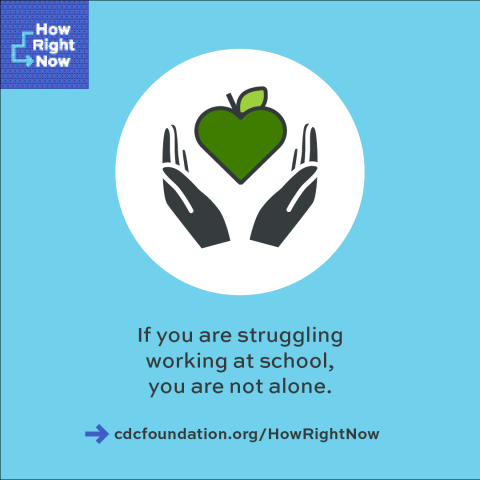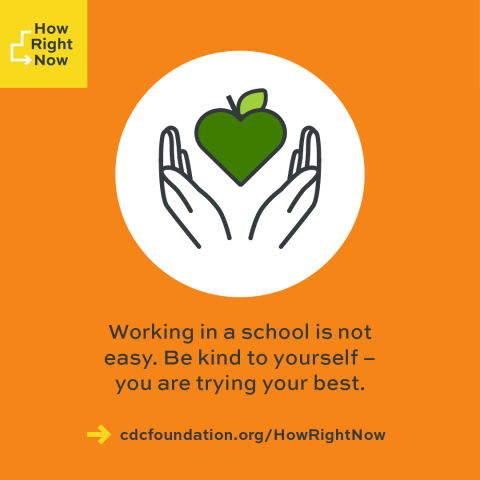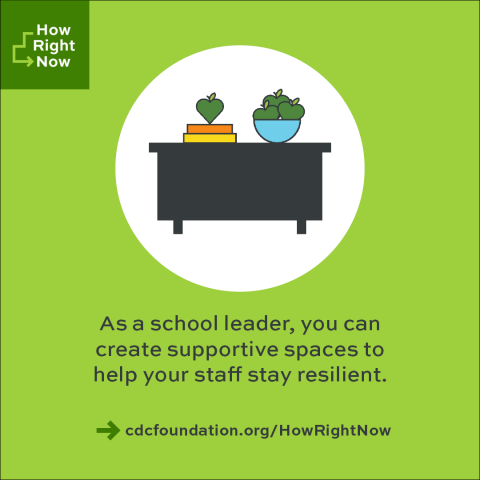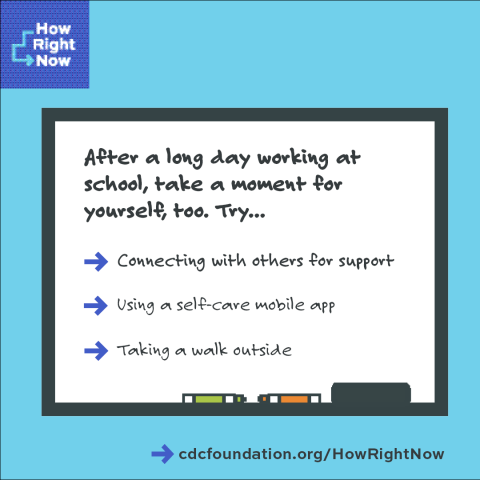How Right Now
The award-winning mental health communications campaign How Right Now (HRN) is designed to strengthen the emotional well-being and resiliency of people experiencing stress, grief and loss through targeted messaging that links to support resources.
Launched in August 2020, HRN was initially developed to provide mental health and emotional support to people during the pandemic. The current focus of the initiative is on understanding and supporting the needs of public-school K-12 teachers and school staff who are encountering high levels of stress, burnout and grief. According to a recent Gallup poll, 44 percent of our educators are suffering from exhaustion, feelings of detachment, ineffectiveness and a lack of accomplishment.
The goal of HRN is to increase the coping skills of teachers and staff and enhance their ability to adapt and be resilient by increasing awareness of emotional health issues and the mental wellness resources available to help.
Watch what teachers and school staff have to say about the importance of supporting your mental health needs:
Related Mental Health Resources
- Suicide and Crisis Lifeline—confidential, free and available 24/7/365
- Call or text 988
- Chat at 988lifeline.org
- TTY users can use their preferred relay service or dial 711 then 988
- Mental Health America resources
- 50 Resources to Support the Mental Health of Teachers and School Staff: Teach.com
- Mental Health and Wellness Resources: Teach for America
- For Administrators -- Supporting School Staff: Kognito
Self-Care Strategies
- Strategies for Teaching With Depression: Edutopia
- Self-Care Tips for Teachers: UNICEF
- 10 Teacher Mental-Health Tips You Can Put Into Practice Today: Everfi
Resiliency
- Teacher Wellbeing Strategies: Resilient Educator
- Rural Teacher Resiliency Guide: I Am a Rural Teacher
- Adult Resilience Curriculum (ARC): Mid-America Mental Health Technology Transfer Center (MHTTC)
- Compassion Resilience Toolkit for Schools: WISE End Stigma
Supporting Grieving Students
- Coalition to Support Grieving Students: Training modules, talking points and more
- National Center for School Crisis and Bereavement: Guides, toolkits and more
- Moving From Grief to Wellness in Schools: Pediatrician Dr. David Schonfeld
Webcasts/Podcasts/Apps
- Taking Care of Educators Who Take Care of Kids: MHTTC Webinar Series
- Promoting Educator Well-Being: Understanding and Combating Compassion Fatigue, Burnout, and Secondary Traumatic Stress | MHTTC Webinar
- Mental Health Matters for Aspiring Educators: NEA Today Podcast
- Mental Health Matters: Teachers as Hope Givers | GPB Education Podcast Video
- Teacher Well-Being Workbook: Teacherwise
- Calm app
- Headspace app
Campaign Partners
Social Media Assets

Sample Message: A lot is being asked of people working in schools. The challenges you are facing are hard—you don’t have to go through them alone. It can help to connect with someone you trust, like a friend or family member about what you are experiencing and feeling.
Visit cdc.gov to learn more.

Sample Message: It may not feel like it all the time, but your work as a teacher is making a difference in people's lives, including your students. Everyone has limits, so be kind to yourself—you are trying your best even when you are not feeling your best.
Learn about resources for support at cdc.gov.

Sample Message: As a school leader, meeting the needs of your students and staff can sometimes feel overwhelming. Nobody can do it all! It’s OK to spend time doing something that re-energizes you. Take a moment to appreciate what you accomplished today.
Learn about strategies to relieve stress at cdc.gov.

Sample Message: As a school leader, you may be dealing with many challenges. Take a moment to appreciate that you are trying your best, even if you have limited resources. Nobody has all the answers, but you can help your staff stay resilient by creating opportunities and spaces where staff feel safe to share what they are going through.
Find more strategies and resources at cdc.gov.

Sample Message: Working in a school is challenging, and nobody can do it all. It’s OK to spend time doing something that re-energizes you. Using a self-care mobile app can help.
Learn about other strategies you can try at cdc.gov.

![[Insert Quote]](/sites/default/files/styles/mobile_width/public/2024-02/hrn_teachers_graphic_6.png?itok=6M87nYgO)